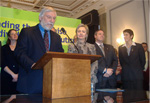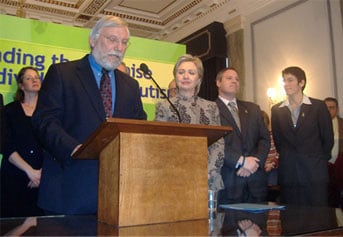Senators Clinton and Allard Introduce Bill to Meet Increasing Needs for Autism Services
March 20, 2007

|
 |
| AUCD Executive Director George S. Jesien, PhD, makes remarks at a press conference where Senators Clinton (D-NY) and Allard (R-CO) introduced the “Expanding the Promise to Individuals with Autism Act”. |
SILVER SPRING, MD (March 20, 2007)—The Association of University Centers on Disabilities (AUCD) applaud Senators Hillary Clinton (D-NY) and Wayne Allard (R-CO) for their leadership and work to address the critical needs of the rising number of individuals with autism spectrum disorders in this country. Clinton and Allard introduced a bipartisan bill today that addresses the urgent needs of thousands of individuals with autism spectrum disorder and their families for effective treatments, interventions, services, and supports.
According to a recent report by the Centers for Disease Control and Prevention, the prevalence of autism has reached epidemic proportions, now affecting one in every 150 children. While continued research efforts are essential to better understand the growth in autism spectrum disorders, there are immediate needs for community services and supports.
"Clearly from the information we get from our University Centers and the families they serve, our current service system is unprepared to meet the growing needs of individuals with autism and their families," stated George Jesien, Executive Director of AUCD. "This bill addresses the everyday need for services, supports, and interventions that families are seeking throughout our country and builds on the recently passed Combating Autism Act which focuses on the important research that needs to take place for us to understand this developmental disability."
There are pressing needs for trained professionals to better serve children and adults with autism with the latest evidence-based information and effective practices. Royal Walker, AUCD Board President and Associate Director of the Institute for Disability Studies at the University of Southern Mississippi stated, "This bill recognizes the tremendous importance of disseminating the latest scientific findings for effective interventions and supports and the need to build capacity by training those who now and in the future will work with children and adults."
The "Expanding the Promise to Individuals with Autism Act" greatly helps to address these issues by providing immediate services and the development of evidence-based treatment interventions, services, and supports for children and adults. The membership of AUCD includes a network of 67 University Centers for Excellence in Developmental Disabilities located in every US state and territory. These University Centers provide research, education, and service to further independence, productivity, and quality of life for individuals with developmental disabilities, including autism. University Centers collaborate with stakeholders in states to identify and address training needs in creative and effective ways. As the prevalence of autism has risen, University Centers have initiated many activities to help meet the growing need for children, adults, and families. This bill builds upon these efforts by expanding the capacity of University Centers to focus on interdisciplinary training of professionals and providers in the area of autism, provide technical assistance, and disseminate information on effective community-based treatment, interventions, and services.
AUCD applauds the commitment of Senators Clinton and Allard to individuals with autism and their families and looks forward to working with them on speedy passage of this bill in the 110th Congress.
The Association of University Centers on Disabilities, located in Silver Spring, MD, is a national, nonprofit organization that promotes and supports the national network of interdisciplinary centers advancing policy and practices through research, education, leadership, and services for and with individuals with developmental and other disabilities, their families, and communities.
###







